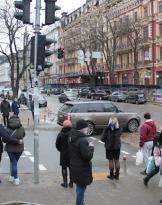Lebanon represents, in the international geopolitical panorama, an important hub for the entire Middle Eastern system. The Islamic State has tried several times to destabilize the country, the latest is today in the early morning at al-Qaa, a predominantly Christian village in the eastern part of the country near the Syrian border, a series of suicide bombings have caused the deaths of nine people, including four suicide bombers, and the wounding of at least fifteen others. But in addition to the hot borders of Israel and Syria, the internal problematic issues show a country that is always poised and seeks its balance through dialogue in one of the most articulated religious compositions in the world, with the presence of many different confessions; a constitutional convention provides that the most important institutional positions are entrusted to the three main groups: the president of the Republic is Christian, the prime minister is a Sunni, the president of the parliament is Shiite, a division that is maintained also within the ambit of civil society .
Direct involvement, through Hezbollah's army, in the Syrian war makes it vulnerable. A massive presence of refugees, here we have the highest number of refugees per capita is the highest in the world, before they were only Palestinians now also Syrians, constitutes an unprecedented phenomenon. It is not denied nor hidden the presence of many Sunnis who initially supported the Islamic State, Da'sh, and that with the arrival of the Russians they escaped; today they live in the non-registered refugee camps scattered around the country.
We crossed Lebanon from north to south to analyze the crisis in the Middle East with an exclusive and attentive eye in which a still unresolved and transitory situation emerges. The reality is that one lives in an undeclared state of war which imposes complicated rules; one of many is the entrance and transit in the southern part towards the border with Israel: to go beyond the Litani river requires a permit issued by military services. In one of these passages the authorization was denied to us for reasons that are still unknown, although we showed that we should go to Shama, at the Italian military base, for an interview with his commander, General Nitti. Citizens like to talk, but they prefer to do it without cameras; the situation for the most vulnerable groups is very complicated, often they are unable to access healthcare, mostly in private hands, the public system does not work due to the difficulty of approaching the structures whose roles are divided between several ministries; same thing for education and services that are collapsing due to more and more contracted funding.
The first of the proposed videos is inside the Feast of the Resistance held this year at Nabi Sheet in the Beqa Valley, a territory controlled by Hezbollah.
"The anniversary of the Resistance and Liberation is an important day to try to take advantage of history and build our future." These are the opening words of the long speech by Sayyed Hasan Nasrallah, general secretary of Hezbollah.
The anniversary wants to mark the memory and remember that on this day the Israeli army was forced to withdraw from southern Lebanon after an occupation of 22 years. This is a national celebration and victory, but it is above all among the Hezbollah that the party takes shape because it was the resistance of the Shiite militias to defeat one of the most powerful armies in the Middle East.
Also this year the participation reached extraordinary numbers, as well as various Shiite Imams and Shaykhs, Sunni and Christian representatives who expressed their solidarity for the memory of the enemy's expulsion, for the Resistance and for the inter-religious meeting he also expressed himself in this event. Massive security measures were concentrated in the area, no local police or army soldiers were present, this shows the total independence of this "army". It is undeniable that Hezbollah represents an important and interesting part of the dynamic country of the Cedars which is completely foreign to the rest of the world. It owns and manages entire districts and territorial areas of the country where, while maintaining open dialogue, it is under a pressing and exclusive control of their militias.
Sayyed Nasrallah in his long speech spoke of the Resistance that will never be defeated, he recalled that the enemy Israel continues to hold back the territories of the farms of Shebaa and the Kfar Shouba hills, then urged the Palestinians not to continue to trust those who he made them only promises, not to bet on those who abandoned them for almost 70 years and stressed that "despite possible confusions provoked by the enemy resistance neither Iran nor Syria will ever leave Palestine".
"Some parties refuse to hold parliamentary elections on the pretext of security. Now, this pretext no longer makes sense, the municipal vote proves it." He then urged the adoption of a fair electoral law that guarantees all representations. In closing, he promised that the end of the Islamic State is near, stressing that Hezbollah will go ahead with its successes against the "takfiris" to reach the final victory.
(images of the authors)











